外研版三年级起点三下M5U1教学设计
小学英语外研新标准三年级下册(2022年新编)Module5三下M5U1教案

M5U1 She goes to school on Mondays.一、教学目标1.知识目标:能听、说、认读单词:Monday play goes who on phone,能听懂会说并熟练在情境中运用she goes to school on Monday.会运用Is she/he at home? Yes,she/he is. No,He/she isnt进行问答。
2.能力目标:培养学生模仿点读笔中的语音语调的能力,正确运用英语进行简单的对话。
3.情感目标:积极参与各种课章学习活动、乐于了解国外人文风俗。
二、教学重点:1、理解识记本课单词、短语,会听说一能运用句型He/she goes to schoo on ondays.2、动词的第三人称单数变化一plays,以及在否定句和疑问句中动词单三形式的转移三、教法是情境教学法:任务型教学法四、教具课件:CD-ROM五、教学过程up.师生激情打招呼)I like coffee. I like tea.I like cats and they like me.I like coffee. I like tea.I don't likelions and they don't like me.[设计意图]:以简单的chant热身,活跃课堂气氛,既复习了之前程学习的知识,同时为下文的学习做好铺垫:以简单的chant热身,活跃课堂气氛,既复习了之前学习的知识,同时为下文的学习做好铺垫。
Step2. Presentation. T: Do you like football Ss: Yes,I do /t.找几组学生进行问答。
给表现好的同学所在小组加分鼓励。
1.(1)出示运动相关的词语并让学生进行复习并问答T: Do youlike play football引导学生说Yes,Ido .No,I don t.(2)课件出示课本第一部分内容,点读笔导读后让学生先听一遍录音,然后跟读,齐读。
外研版(三年级起点)三下M5U1教案
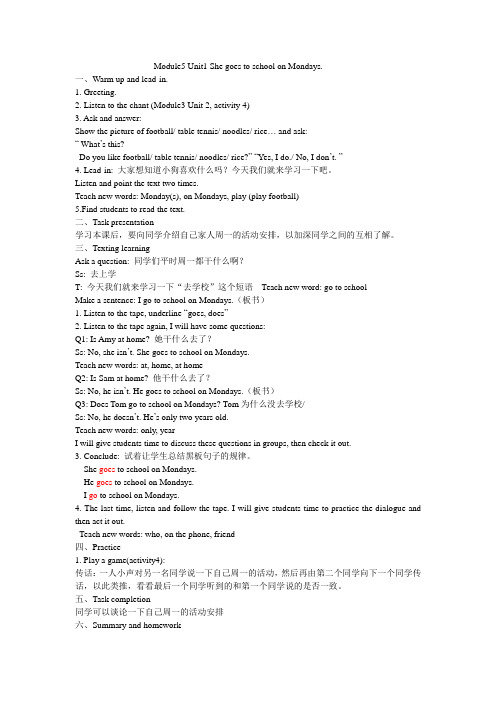
Module5 Unit1 She goes to school on Mondays.一、Warm up and lead-in.1. Greeting.2. Listen to the chant (Module3 Unit 2, activity 4)3. Ask and answer:Show the picture of football/ table tennis/ noodles/ rice… and ask:“ What’s this?Do you like football/ table tennis/ noodles/ rice?”“Yes, I do./ No, I don’t. ”4. Lead-in: 大家想知道小狗喜欢什么吗?今天我们就来学习一下吧。
Listen and point the text two times.Teach new words: Monday(s), on Mondays, play (play football)5.Find students to read the text.二、Task presentation学习本课后,要向同学介绍自己家人周一的活动安排,以加深同学之间的互相了解。
三、Texting learningAsk a question: 同学们平时周一都干什么啊?Ss: 去上学T: 今天我们就来学习一下“去学校”这个短语Teach new word: go to schoolMake a sentence: I go to school on Mondays.(板书)1. Listen to the tape, underline “goes, does”2. Listen to the tape again, I will have some questions:Q1: Is Amy at home? 她干什么去了?Ss: No, she isn’t. She goes to school on Mondays.Teach new words: at, home, at homeQ2: Is Sam at home? 他干什么去了?Ss: No, he isn’t. He goes to school on Mondays.(板书)Q3: Does Tom go to school on Mondays? Tom为什么没去学校/Ss: No, he doesn’t. He’s only two years old.Teach new words: only, yearI will give students time to discuss these questions in groups, then check it out.3. Conclude: 试着让学生总结黑板句子的规律。
(三起点)外研版三年级英语下册《Module5_Unit1_名师教案【广西崇左】》

课题Module 5 Unit 1She goes to school on Mondays.课型听说课授课者课时第一课时学情分析本课的教学对象是小学三年级始学英语的学生,这一年龄阶段的孩子注意力集中的时间较短,因此,教师在课堂上设计生动活泼、形式多样的活动吸引孩子们的注意力。
小学三年级的学生读本节课出现的英语长句倍感困难。
教学目标1. 知识目标:能听、说、认读:goes, goes to school, on Mondays会认读:phone, with, friend, at, home, who, only, year, on the phone, at home, years old。
掌握并运用句子:She goes to school on Mondays.2. 能力目标:(1)学生能听说认读活动2的对话,并进行角色扮演。
(2)能听懂会说并在情境中运用本课的重点句型。
3. 情感目标:快乐上学,快乐运动。
重点 1. 能听说认读本课重点单词、短语,句子。
2. 能对活动2进行角色表演。
难点 1. 初步理解和运用动词go的第三人称形式的变化:go—goes2. 长句子的朗读。
教学方法情境教学法;任务型教学法;TPR。
教具课件,单词卡片,句子卡片,人物图片,电话模型。
教学过程Step 1. Greetings and warming up.T: Do you like sports?Ss: Yes, I do.T: Let’s do some actions.Step 2. New presentation.1. Show the title: She goes to school on Mondays.2. PPT: 全家福。
介绍Ms Smart一家,包括宠物小猫小狗,设置情景。
3. Activity 1 的教学。
情境:Ms Smart 的两只宠物在院子里玩。
(1) Teach “Monday on Mondays”播放单词音频1遍,单词卡片高低音操练单词。
三年级下册英语教学设计-Module 5 Unit 1 She goes to school on
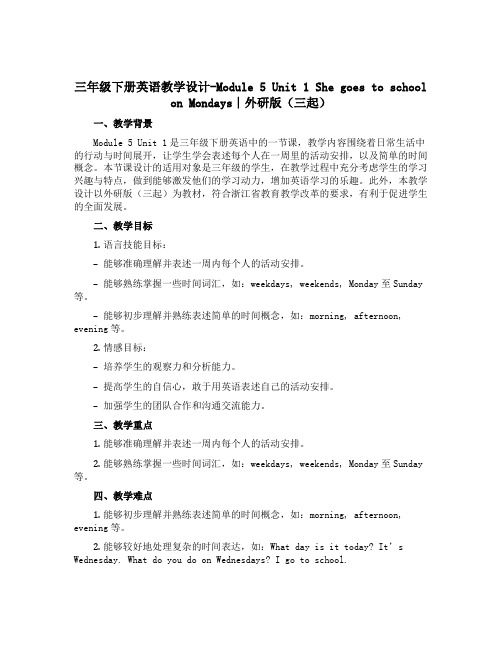
三年级下册英语教学设计-Module 5 Unit 1 She goes to schoolon Mondays∣外研版(三起)一、教学背景Module 5 Unit 1是三年级下册英语中的一节课,教学内容围绕着日常生活中的行动与时间展开,让学生学会表述每个人在一周里的活动安排,以及简单的时间概念。
本节课设计的适用对象是三年级的学生,在教学过程中充分考虑学生的学习兴趣与特点,做到能够激发他们的学习动力,增加英语学习的乐趣。
此外,本教学设计以外研版(三起)为教材,符合浙江省教育教学改革的要求,有利于促进学生的全面发展。
二、教学目标1.语言技能目标:–能够准确理解并表述一周内每个人的活动安排。
–能够熟练掌握一些时间词汇,如:weekdays, weekends, Monday至Sunday 等。
–能够初步理解并熟练表述简单的时间概念,如:morning, afternoon, evening等。
2.情感目标:–培养学生的观察力和分析能力。
–提高学生的自信心,敢于用英语表述自己的活动安排。
–加强学生的团队合作和沟通交流能力。
三、教学重点1.能够准确理解并表述一周内每个人的活动安排。
2.能够熟练掌握一些时间词汇,如:weekdays, weekends, Monday至Sunday 等。
四、教学难点1.能够初步理解并熟练表述简单的时间概念,如:morning, afternoon, evening等。
2.能够较好地处理复杂的时间表达,如:What day is it today? It’s Wednesday. What do you do on Wednesdays? I go to school.五、教学过程设计5.1 新课导入根据学生的学习特点进行教学,我采用如下方式展开新课导入:1.引入新词汇及活动:weekdays, weekends, Monday至Sunday等。
2.展示一份时间表,让学生看一看并大声读出每天的活动。
Module5Unit1ShegoestoschoolonMondays.(教案)-英语三年级下册
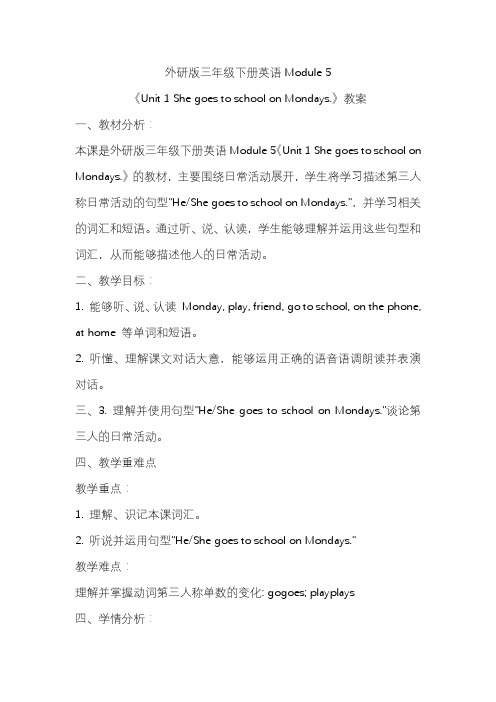
外研版三年级下册英语Module 5《Unit 1 She goes to school on Mondays.》教案一、教材分析:本课是外研版三年级下册英语Module 5《Unit 1 She goes to school on Mondays.》的教材,主要围绕日常活动展开,学生将学习描述第三人称日常活动的句型"He/She goes to school on Mondays.",并学习相关的词汇和短语。
通过听、说、认读,学生能够理解并运用这些句型和词汇,从而能够描述他人的日常活动。
二、教学目标:1. 能够听、说、认读Monday, play, friend, go to school, on the phone, at home 等单词和短语。
2. 听懂、理解课文对话大意,能够运用正确的语音语调朗读并表演对话。
三、3. 理解并使用句型"He/She goes to school on Mondays."谈论第三人的日常活动。
四、教学重难点教学重点:1. 理解、识记本课词汇。
2. 听说并运用句型"He/She goes to school on Mondays."教学难点:理解并掌握动词第三人称单数的变化: gogoes; playplays四、学情分析:学生已经学过一些基础的英语词汇和句型,但对于动词第三人称单数的变化可能还不太熟悉。
他们具有一定的听说能力,但需要更多的练习和巩固。
因此,本节课的教学重点是帮助学生掌握新的词汇和句型,并加强对动词第三人称单数变化的理解和运用。
五、教学过程:Step 1: Warmup1. 教师与学生互动,用英语进行日常活动的问答:Teacher: "What day is it today?"Student: "Today is Monday."Teacher: "What do you do on Mondays?"Student: "I go to school on Mondays."Step 2: Presentation1. 教师展示图片或实物,教授词汇的发音和意思:Teacher: "This is Monday. Can you say 'Monday'?"Students: "Monday."Teacher: "Good! What day es after Sunday?"Students: "Monday."Teacher: "Correct! Now let's learn another word. This is 'play'. Can you say 'play'?"Students: "Play."Teacher: "Excellent! 'Play' means to have fun or engage in a game or activity. Can you give me an example sentence with 'play'?"Students: "I like to play soccer."Step 3: Practice1. 教师播放课文对话录音,让学生跟读。
三年级英语下册 module5 unit1教案 外研版 精品

外研版三年级英语下册教案Module 5 TimeUnit 1 I get up at seven o’clockTeaching Aims:1. Talking about “time”.2. Enable the Ss to say “get up” “go to school” “have lunch” “go home” “watch TV” “go to bed”.Teaching points:Grasp the important words and phrases.Teaching Procedures:1) Warming upGreetings:T: Hello, boys and girls.Ss: Hello, Miss Yang.T: What day is it today?Ss: Today is …….T: Are you happy?Ss: Yes, we are.Saying a chantOne, two, three, four.Come in please and close the door.Five, six, seven, eight.Go to school and don’t be late.Nine, ten, nine, ten.Learn English again and again.3. Singing: “Good morning Sam?’’2) New concept.1. T: Oh, you are so clever. Today, let us learn Module 5 Time Unit 1 I get up at sevenO’clock. (Writing and Reading)T: Hello, boys and girls. What’s this?Ss:It’s a clock.T: You are so clever.T: Do you know? What’s the time? (Explain in Chinese)Ss: 8: 10T: How to say in English?Ss: I don’t know.T: Ok, I will tell you. It's eight ten .表示8点过10 分。
小学英语_外研版三起三年级下册M5U1She goes to school on Mondays.教学设计学情分析教材分析课后反思
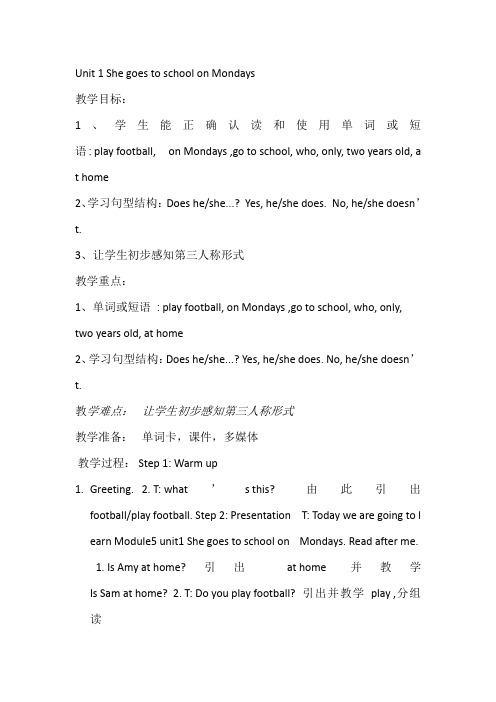
Unit1She goes to school on Mondays教学目标:1、学生能正确认读和使用单词或短语:play football,on Mondays,go to school,who,only,two years old,a t home2、学习句型结构:Does he/she...?Yes,he/she does.No,he/she doesn’t.3、让学生初步感知第三人称形式教学重点:1、单词或短语:play football,on Mondays,go to school,who,only,two years old,at home2、学习句型结构:Does he/she...?Yes,he/she does.No,he/she doesn’t.教学难点:让学生初步感知第三人称形式教学准备:单词卡,课件,多媒体教学过程:Step1:Warm up1.Greeting.2.T:what’s this?由此引出football/play football.Step2:Presentation T:Today we are going to l earn Module5unit1She goes to school on Mondays.Read after me.1.Is Amy at home?引出at home并教学Is Sam at home?2.T:Do you play football? 引出并教学play,分组读T:Do you play football on Monday/on Mondays?引出并教学on Monday/on Mondays,方法同上,引导学生回答 3.抽一个学生T:Do you play football on Mondays?过渡到Do you go to school on Mondays? 引出并教学go to school,方法同上。
外研版三年级英语下册第五模块第一单元教案M5U1教案

外研版三年级英语下册第五模块第一单元教课设计 M5U1教课设计教课目的:1.学习并能口头运用I get up at seven o’ clock.这种语句描绘自己的2-3 种平时活动。
2.学习并能在图片提示下辨别单词at , o’ clock ;短语 get up, go to school, have lunch, go home, watch TV, go to bed教课要点:1.词汇: o’ clock, at, get up, go to school, have lunch, go home, watch TV, go to bed2 .语言构造: I get up at seven o’clock.教课难点:1.词汇: go to school, have lunch, get up, go to bed, watch TV, go home2.能运用所学介绍自己的每天作息时间安排。
教具准备:钟表、教课卡片、PPT。
教课过程:I、Warming up :1 、T:Hello,boys and girls:Are you happy today?2、Let ’ s sing the Ten Little Fingers song.II、Revision:咨询学生及其父亲母亲的爱好。
III、 Presentation:(OK)Today,let ’s learn Module 5 Time Unit 1 I getup at seven O’clock.Well done! Look(师出示一个钟表)What’s this?(同时展现 PPT: It’ s a clock.)T:Do you know?What’ s the time? (Explain in Chinese)Ss: 1:00T: How to say in English?Ss: I don’t know.T: Ok, I will tell you.It’ s one o’ clock .(表示 1 点。
小学英语外研版(三起)三年级下册+module5+unit1+教案
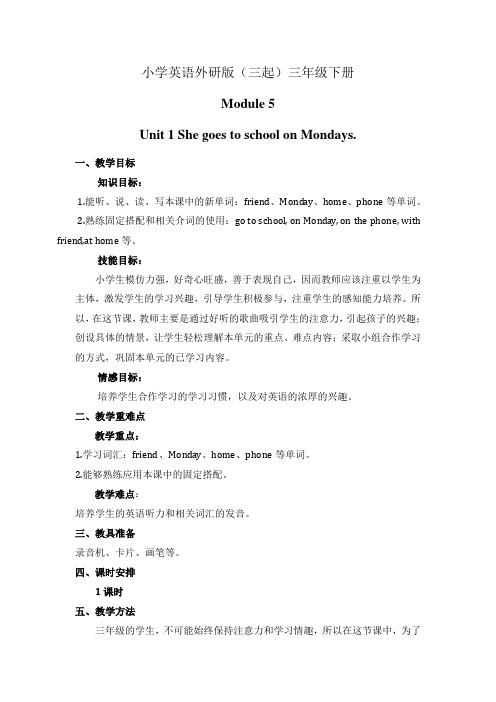
小学英语外研版(三起)三年级下册Module 5Unit 1 She goes to school on Mondays.一、教学目标知识目标:1.能听、说、读、写本课中的新单词:friend、Monday、home、phone等单词。
2.熟练固定搭配和相关介词的使用:go to school, on Monday, on the phone, with friend,at home等。
技能目标:小学生模仿力强,好奇心旺盛,善于表现自己,因而教师应该注重以学生为主体,激发学生的学习兴趣,引导学生积极参与,注重学生的感知能力培养。
所以,在这节课,教师主要是通过好听的歌曲吸引学生的注意力,引起孩子的兴趣;创设具体的情景,让学生轻松理解本单元的重点、难点内容;采取小组合作学习的方式,巩固本单元的已学习内容。
情感目标:培养学生合作学习的学习习惯,以及对英语的浓厚的兴趣。
二、教学重难点教学重点:1.学习词汇:friend、Monday、home、phone等单词。
2.能够熟练应用本课中的固定搭配。
教学难点:培养学生的英语听力和相关词汇的发音。
三、教具准备录音机、卡片、画笔等。
四、课时安排1课时五、教学方法三年级的学生,不可能始终保持注意力和学习情趣,所以在这节课中,为了保持孩子们学习兴趣和尽可能地提高学习效率,教师要通过小游戏、有意思的图片和场景,来吸引学生的注意力,进一步培养学生对英语的学习兴趣。
六、教学过程七、板书设计Module 5 Unit 1 She goes to shool on Mondays.Is Amy at home?No,she isn’t.She goes to school on Mondays.Is Sam at home?No,he isn’t.He goes to school on Mondays too.Who’s that?It’s Tom.Does Tom go to school on Mondays?No,he doesn’t.He’s only two years ol d!I play football on Mondays.She plays football on Mondays.八、教学反思本课通过真实的场景,有意思的图片,小游戏等很多方法进行教学,不仅让学生们学到了对这些生活的单词有了更进一步认识,并且引导学生热爱。
三年级下册英语教案-M5U1ShegoestoschoolonMondays外研社(三起)
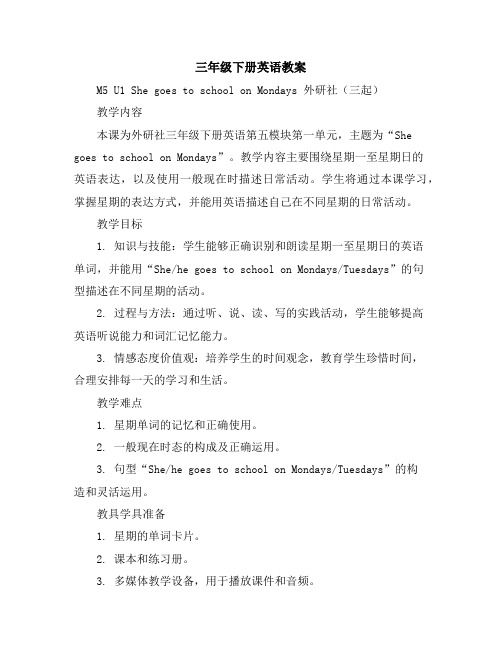
三年级下册英语教案M5 U1 She goes to school on Mondays 外研社(三起)教学内容本课为外研社三年级下册英语第五模块第一单元,主题为“She goes to school on Mondays”。
教学内容主要围绕星期一至星期日的英语表达,以及使用一般现在时描述日常活动。
学生将通过本课学习,掌握星期的表达方式,并能用英语描述自己在不同星期的日常活动。
教学目标1. 知识与技能:学生能够正确识别和朗读星期一至星期日的英语单词,并能用“She/he goes to school on Mondays/Tuesdays”的句型描述在不同星期的活动。
2. 过程与方法:通过听、说、读、写的实践活动,学生能够提高英语听说能力和词汇记忆能力。
3. 情感态度价值观:培养学生的时间观念,教育学生珍惜时间,合理安排每一天的学习和生活。
教学难点1. 星期单词的记忆和正确使用。
2. 一般现在时态的构成及正确运用。
3. 句型“She/he goes to school on Mondays/Tuesdays”的构造和灵活运用。
教具学具准备1. 星期的单词卡片。
2. 课本和练习册。
3. 多媒体教学设备,用于播放课件和音频。
4. 学生准备笔记本和文具。
教学过程1. 导入:通过播放星期歌,让学生在轻松愉快的氛围中复习和巩固星期单词。
2. 新课展示:利用课件展示本课的主要句型,并通过图片和动作示范,让学生理解句型的含义和用法。
3. 小组活动:学生分小组,用句型“She/he goes to school on Mondays/Tuesdays”进行对话练习,教师巡回指导。
4. 课堂练习:完成练习册上的相关练习,巩固新学的知识。
板书设计1. 星期一至星期日的英语单词。
2. 句型“She/he goes to school on Mondays/Tuesdays”。
3. 一般现在时的构成。
作业设计1. 抄写星期单词和句型,加强记忆。
三年级-外研版(三起点)-英语-下册-[教学设计]-Module-5-Unit-1-(3)
![三年级-外研版(三起点)-英语-下册-[教学设计]-Module-5-Unit-1-(3)](https://img.taocdn.com/s3/m/1a62a37ba66e58fafab069dc5022aaea998f41ae.png)
Module 5Unit 1 She goes to school on Mondays.一、教学重点与难点:1. 重点:运用核心语言描述自己及家人周一的日常活动。
2. 难点:准确描述家人的日常活动。
二、教学准备:PPT,练习纸,音频、视频支持三、教学目标:语言知识与技能目标:1. 能在与朋友打电话的语境中,听懂,正确跟读核心词汇goes, on, Mondays, play, with, friend, at, home, who, year.2. 在与朋友打电话的语境中,听懂,读懂核心句型She does ... on Mondays.和He doesn’t ... on Mondays.语用任务:在与朋友打电话的语境中,结合已学语言知识,运用核心语言描述家人周一的日常活动。
要求内容基本达意,语音基本正确。
四、教学过程Step Ⅰ Pre-task preparationsListen a song, look and sing.【设计意图】用有趣的歌曲激发学生兴趣,复习以前学过的球类运动,呈现核心词汇play。
Step Ⅰ While-task procedures1. Listen and say.(1) Look and say.(2) Read after the tape.【设计意图】问题驱动,学习核心词汇2. Listen and answer.Think and say. 问题驱动,学习核心内容3. Listen and choose.Listen and say. 巩固所学课文,跟读课文原句。
4. Listen and imitate.Read after the tape.5. Think and choose.Step Ⅰ Post-task acticities1. Let’s say.Look and say. 以看图造句的方式,进一步巩固核心语言。
2. Review.Read with me. 总结本课所学核心单词和句型,加深理解。
外研版三年级英语下 教案 M5 U1
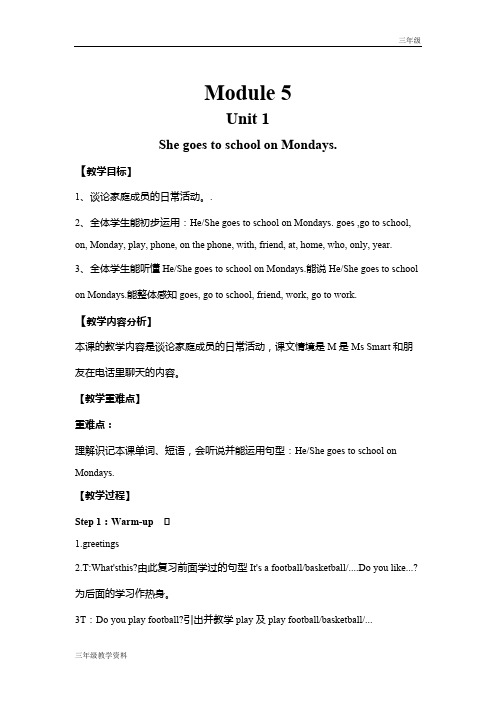
Module 5Unit 1She goes to school on Mondays.【教学目标】1、谈论家庭成员的日常活动。
.2、全体学生能初步运用:He/She goes to school on Mondays. goes ,go to school, on, Monday, play, phone, on the phone, with, friend, at, home, who, only, year.3、全体学生能听懂He/She goes to school on Mondays.能说He/She goes to school on Mondays.能整体感知goes, go to school, friend, work, go to work.【教学内容分析】本课的教学内容是谈论家庭成员的日常活动,课文情境是M是Ms Smart和朋友在电话里聊天的内容。
【教学重难点】重难点:理解识记本课单词、短语,会听说并能运用句型:He/She goes to school on Mondays.【教学过程】Step 1:Warm-up1.greetings2.T:What'sthis?由此复习前面学过的句型It's a football/basketball/....Do you like...?为后面的学习作热身。
3T:Do you play football?引出并教学play及play football/basketball/...Step 2:Presentation1、播放第一部分的动画,请学生看图回答问题。
1)T:看了这个短片,同学们了解短片的内容吗?2)T:小猫问了小狗哪些问题呢?2、让学生自己理解语境,再次播放动画,请学生跟读。
3、教学on Mondays,并区分与on Monday的不同之处。
Step 3:Text teaching1、播放第二部分的动画,请生看图理解课文大意。
最新外研版小学英语三年级下册M5教学案1
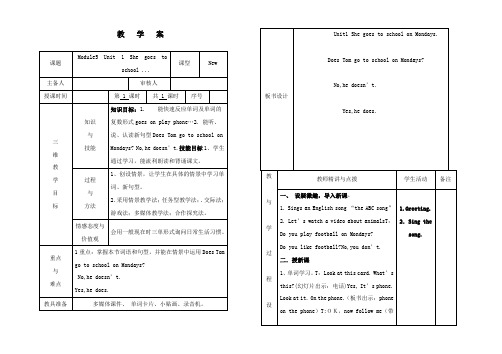
学生活动
备注
1. Sings an English song “the ABC song” 1.Greeting. 2. Let’s watch a video about animalsT: 2.Sing the Do you play football on Mondays? Do you like football?No,you don’t. song.
1、 单词学习。 T:Look at this card. What’s this?(幻灯片出示:电话)Yes, It’s phone. Look at it. On the phone. (板书出示:phone on the phone)T:OK,now follow me(带
计
动作)。T:OK,there is another card coming. what’s this?(with friend„,举 3.Learn the 一反三)T: Ok,now follow me(带动作) 。 new words. 单词学习可以师范读,教读,学生个别读,小 组读等掌握其读音。 教师展示卡片, 检查学生 的学习情况,纠正个别单词错误发音。 2、课文学习 第一遍整体感知,掌握正确发音; 第二遍边听边说出黑板上的生词; 第三遍,逐句跟读、模仿语音语调。 教 学生以小组为单位分角色读课文。 三、小组展示,认知共享。 1.T:Who wants to show?教师选择部分小组 4.Learn the 展示本组学习成果 2.小组展示时, 采取小老师主持的形式进行展 示汇报, 展示完本组学习成果还要随机检查其 他学生生词、 课文的学习情况。 生词主要从读 音、汉意、拼写等几个方面检查;课文主要以 课文的理解和朗读为主, 包括边读边译、 逐句 读、齐读、分角色读等。 text. 教师精讲与点拨 学生活动 备注
外研版英语三年级下册Module5 unit1教学设计
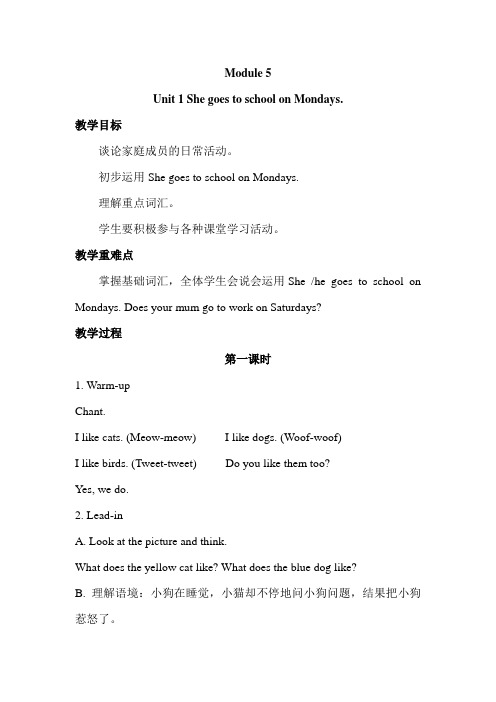
Module 5Unit 1 She goes to school on Mondays.教学目标谈论家庭成员的日常活动。
初步运用She goes to school on Mondays.理解重点词汇。
学生要积极参与各种课堂学习活动。
教学重难点掌握基础词汇,全体学生会说会运用She /he goes to school on Mondays. Does your mum go to work on Saturdays?教学过程第一课时1. Warm-upChant.I like cats. (Meow-meow) I like dogs. (Woof-woof)I like birds. (Tweet-tweet) Do you like them too?Yes, we do.2. Lead-inA. Look at the picture and think.What does the yellow cat like? What does the blue dog like?B. 理解语境:小狗在睡觉,小猫却不停地问小狗问题,结果把小狗惹怒了。
C. Listen, point and say.3. Task presentationDoes the blue dog play football on Mondays? No, he doesn’t.小蓝狗星期一踢足球了吗?不,他没有。
那么接下来我们看一下Amy三姐弟他们在星期一都做些什么吧。
4. Text learningA. Listen, point and find “goes, does”.B. Listen, point and say. 讲解课文,并板书。
C. Read after the tape.5. PracticeA. Listen and say. (P28)Amy goes to school on Mondays. Tom doesn’t go to school on Mondays.B. Do and say.(P28)6. Task completionExercises.7. Summary and homework.A. Read the text 3 times.B. 向同伴说说自己家人在星期一的活动。
三年级下册英语教学设计-Module 5 Unit 1 She goes to school on
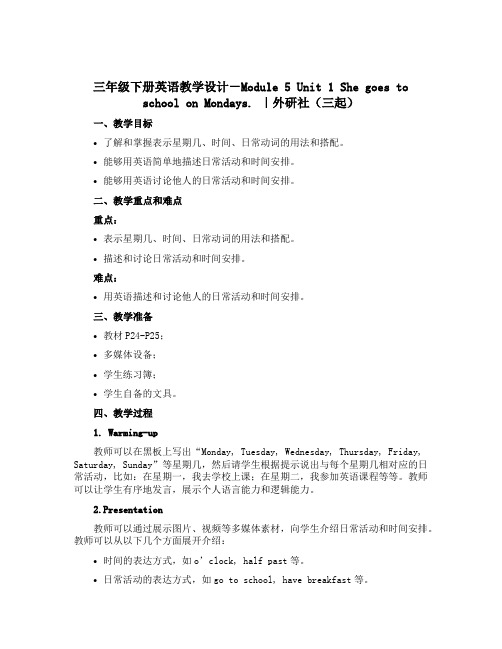
三年级下册英语教学设计-Module 5 Unit 1 She goes toschool on Mondays. |外研社(三起)一、教学目标•了解和掌握表示星期几、时间、日常动词的用法和搭配。
•能够用英语简单地描述日常活动和时间安排。
•能够用英语讨论他人的日常活动和时间安排。
二、教学重点和难点重点:•表示星期几、时间、日常动词的用法和搭配。
•描述和讨论日常活动和时间安排。
难点:•用英语描述和讨论他人的日常活动和时间安排。
三、教学准备•教材P24-P25;•多媒体设备;•学生练习簿;•学生自备的文具。
四、教学过程1. Warming-up教师可以在黑板上写出“Monday, Tuesday, Wednesday, Thursday, Friday, Saturday, Sunday”等星期几,然后请学生根据提示说出与每个星期几相对应的日常活动,比如:在星期一,我去学校上课;在星期二,我参加英语课程等等。
教师可以让学生有序地发言,展示个人语言能力和逻辑能力。
2.Presentation教师可以通过展示图片、视频等多媒体素材,向学生介绍日常活动和时间安排。
教师可以从以下几个方面展开介绍:•时间的表达方式,如o’clock, half past等。
•日常活动的表达方式,如go to school, have breakfast等。
•通过图片、视频、真人表演等多种方式展示日常活动和时间安排。
3. Practice教师可以向学生提供相关的练习材料,比如说日常活动的句子,学生可以完成这些句子的填空。
如She _____ (go) to school on Mondays. Tom _____ (play) football on Sundays等等。
学生可以选择正确的动词填入相应的句子中。
教师也可以让学生编写自己的日程表。
学生可以将每个时间段的活动写在纸上,如7:00am-8:00am吃早餐,8:00am-9:00am上午课程,9:00am-10:00am外教课等等。
外研版英语小学三年级下册教学设计-Module 5 Unit 1She goes to school on Mondays.(教案)
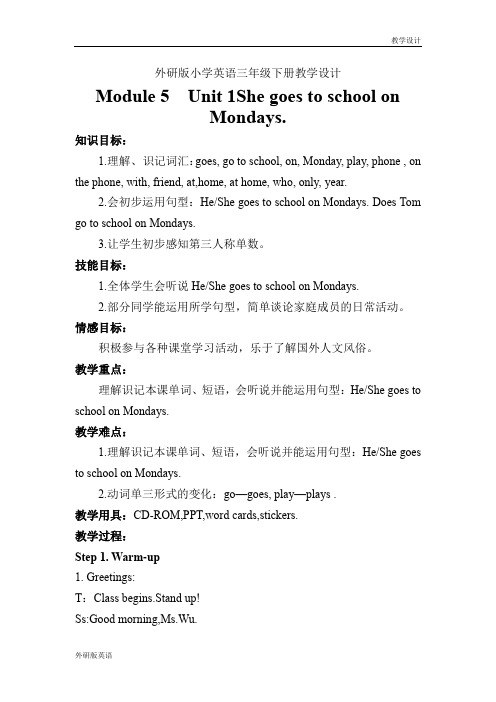
外研版小学英语三年级下册教学设计Module 5 Unit 1She goes to school onMondays.知识目标:1.理解、识记词汇:goes, go to school, on, Monday, play, phone , on the phone, with, friend, at,home, at home, who, only, year.2.会初步运用句型:He/She goes to school on Mondays. Does Tom go to school on Mondays.3.让学生初步感知第三人称单数。
技能目标:1.全体学生会听说He/She goes to school on Mondays.2.部分同学能运用所学句型,简单谈论家庭成员的日常活动。
情感目标:积极参与各种课堂学习活动,乐于了解国外人文风俗。
教学重点:理解识记本课单词、短语,会听说并能运用句型:He/She goes to school on Mondays.教学难点:1.理解识记本课单词、短语,会听说并能运用句型:He/She goes to school on Mondays.2.动词单三形式的变化:go—goes, play—plays .教学用具:CD-ROM,PPT,word cards,stickers.教学过程:Step 1. Warm-up1. Greetings:T:Class begins.Stand up!Ss:Good morning,Ms.Wu.T:Good morning,boys and girls.How are you?Ss:I’m fine,thank you.And how are you?T:I’m fine,too.Thank you!2.Chant.T:Now let’s say a chant together,OK?Ss:OK!(PPT展示chant 内容)I like coffee. I like tea.I like cats and they like me.I like coffee. I like tea.I don’t like lions and they don’t like me.(chant together)Step 2. Lead-in1.展示足球以及踢足球图片T:He likes football.He is playing football(加上动作帮助学生理解)T:Do you play football?引出并教学play ,分组读,高低音读,开火车,抽读2.T:Do you play football on Monday/on Mondays? 引出并教学on Monday/on Mondays(Read together and in groups)引导学生回答:Yes,I do/No,I don’t.3.T:Do you play football on Mondays?Sa:Yes, I do. Sb:No,I don’t.T:Do you go to school on Mondays?教授go to school(搭配上背书包上学动作,让学生加深记忆)Sc:Yes, I do./No,I don’t.T:Does he/she go to school on Mondays?引导全班学生回答:Yes,she/he does./No,she/he doesn’t.Pick up two students and ask them to whisper answers.T:OK.Now only I know the answer, do you want to know?Ss:Yes!T:Ask me with the sentence I taught you.(PPT上有呈现该句子)Ss:Does he/she go to school on Mondays?T:Yes,she/he does./No,she/he doesn’t.4.(PPT上出现little Tom 照片)T:look ,who’s that boy?引出并教学whoDoes he go to school on Mondays?Ss:No ,he doesn’t.Step3 Learn the text1.T: Yes, he doesn’t go to school on Mondays. Do you know why?(课件示图) Because he’s only two years old.教学only ,two years old(Read together and in groups)T:today we are going to learn Module5 unit1 She goes to school on Mondays.read after me(板书课题)Listen and answer:A. Is Amy at home?(引出at home并教学)B.Is Sam at home?Look at the cartoon and then choose some students to answer these questions.Who answers right can get a little star.2.Listen,and find ‘goes,does’.3.PPT,词卡以及实物新授:phone, on the phone,with, friend.Ms Smart is on the phone with her friend.4.T:Let’s read after the CD and imitate the intonation and emotion of them.5.T:Stand up and read again.(Read together,read in groups and the best group can get a mark.)Step 4 Practice1.T: You did a good job! Now I’ll give you 2 minutes to read the text with your partner.Then we’ll have you do role play on the platform.(Pick 3 groups to come to present on the platform)T:Wonderful! I think your accent is good,keep it!Here’s the sticker.(给予上台同学贴纸奖励)2.Do Activity book Unit1 练习1T:Look at the pictures,try to describe their activities in English or in Chinese.(你能不能描述他们的动作?)Ss:......T:OK,now let’s listen to the CD carefully.(请学生认真完整听一遍)T:This time,please listen and tick the correct answer.Check answers together.T: Let’s read it together,OK?(全班齐读句子)Step 5 Summary通过本节课的学习我们知道Ms Smart的朋友因为在美国,那里可能是周日的晚上,所以才不清楚Sam, Amy 是否在家。
三年级-外研版(三起点)-英语-下册-[教学设计]-Module-5-Unit-1-(2)
![三年级-外研版(三起点)-英语-下册-[教学设计]-Module-5-Unit-1-(2)](https://img.taocdn.com/s3/m/cd66d998c9d376eeaeaad1f34693daef5ef713e9.png)
Module 5Unit 1 She goes to school on Mondays.一、教学目标1. 知识目标:(1) 理解、识记词汇:goes, go to school, on, Monday, play, phone, on the phone, with, friend, at, home, at home, who, only, year.(2) 会初步运用句型:He/She goes to school on Mondays. Does Tom go to school on Mondays?(3) 进一步让学生感知包含实义动词的陈述句和一般疑问句的语音、语调。
2. 能力目标:(1) 全体学生会听说He/She goes to school on Mondays.(2) 部分同学能运用所学句型,简单谈论家庭成员的日常活动。
3. 情感目标:积极参与各种课堂学习活动,乐于了解国外人文风俗。
二、教学重点理解、识记本课单词、短语,会听说并能运用句型:He/She goes to school on Mondays.三、教学难点动词第三人称单数形式的变化:go—goes, play—plays,以及在否定句和疑问句中动词第三人称单数形式的转移。
四、教学准备多媒体课件、食物图片、单词卡片。
五、教学过程Step I Warm-up1. Greetings.2. Chant.I like coffee. I like tea.I like cats and they like me.I don’t like coffee. I don’t like tea.I don’t like lions and they don’t like me.【设计意图】热身,活跃气氛,复习旧知识同时为导入做铺垫。
3. Lead-in.PPT出示图片,复习旧知,导入新授。
Do you like fish/rice/meat/milk?Yes, I do./No, I don’t.Does she/he like fish …?Yes, she/he does./No, she/he doesn’t.Step II Presentation1. 出示单词卡,结合PPT新授词汇:play, on Mondays, play football/basketball/table tennis.Do you play football on Mondays?Yes, I do./No, I don’t.I play football/basketball … on Mondays.He/She plays football … on Mondays.2. 出示单词卡,结合PPT新授词汇:school, go to school.I go to school on Mondays.Amy goes to school on Mondays.She goes to school on Mondays.Sam goes to school on Mondays too.He goes to school on Mondays too.请学生配合:Do you go to school on Mondays?Does he/she go to school on Mondays?Yes, he/she does. / No, he/she doesn’t.3. 出示单词卡,结合PPT新授词汇:at, home, at home, phone, on the phone, with, friend.Is Amy at home? No, she isn’t.Is Sam at home? No, he isn’t.She/Ms Smart is on the phone with her friend.【设计意图】突出强调重点词汇,引导学生注意人称变化,动词随之发生相应的变化。
- 1、下载文档前请自行甄别文档内容的完整性,平台不提供额外的编辑、内容补充、找答案等附加服务。
- 2、"仅部分预览"的文档,不可在线预览部分如存在完整性等问题,可反馈申请退款(可完整预览的文档不适用该条件!)。
- 3、如文档侵犯您的权益,请联系客服反馈,我们会尽快为您处理(人工客服工作时间:9:00-18:30)。
Module5 Unit1 She goes to school on Mondays.
一、Warm up and lead-in.
1. Greeting.
2. Listen to the chant (Module3 Unit 2, activity 4)
3. Ask and answer:
Show the picture of football/ table tennis/ noodles/ rice… and ask:
“ What’s this?
Do you like football/ table tennis/ noodles/ rice?”“Yes, I do./ No, I don’t. ”
4. Lead-in: 大家想知道小狗喜欢什么吗?今天我们就来学习一下吧。
Listen and point the text two times.
Teach new words: Monday(s), on Mondays, play (play football)
5.Find students to read the text.
二、Task presentation
学习本课后,要向同学介绍自己家人周一的活动安排,以加深同学之间的互相了解。
三、Texting learning
Ask a question: 同学们平时周一都干什么啊?
Ss: 去上学
T: 今天我们就来学习一下“去学校”这个短语Teach new word: go to school
Make a sentence: I go to school on Mondays.(板书)
1. Listen to the tape, underline “goes, does”
2. Listen to the tape again, I will have some questions:
Q1: Is Amy at home? 她干什么去了?
Ss: No, she isn’t. She goes to school on Mondays.
Teach new words: at, home, at home
Q2: Is Sam at home? 他干什么去了?
Ss: No, he isn’t. He goes to school on Mondays.(板书)
Q3: Does Tom go to school on Mondays? Tom为什么没去学校/
Ss: No, he doesn’t. He’s only two years old.
Teach new words: only, year
I will give students time to discuss these questions in groups, then check it out.
3. Conclude: 试着让学生总结黑板句子的规律。
She goes to school on Mondays.
He goes to school on Mondays.
I go to school on Mondays.
4. The last time, listen and follow the tape. I will give students time to practice the dialogue and then act it out.
Teach new words: who, on the phone, friend
四、Practice
1. Play a game(activity4):
传话:一人小声对另一名同学说一下自己周一的活动,然后再由第二个同学向下一个同学传话,以此类推,看看最后一个同学听到的和第一个同学说的是否一致。
五、Task completion
同学可以谈论一下自己周一的活动安排
六、Summary and homework
1. Listen and read the text follow the tape.
2. Write Aa-Gg five times.
七、教学板书
Module5 Unit1 She goes to school on Mondays.
He goes to school on Mondays. go to school
I go to school on Mondays. friend
八、教学反思
本课重点没有把握住,学生学习课文后对一般现在时仍存在困惑,对一般现在时的讲解把握不好分寸,学生没有做详细直观的练习所以导致教学效果不太明显。
在活动一的部分听录音次数太少导致学生朗读困难,应至少听两到三次。
在读活动二的课文时练习时间较短,问题讨论过程时间的安排也不够,讨论不够充分,效果不理想。
课题是本课的重点,应该带领学生多读多说,在此比较欠缺。
做游戏环节,教师应该做示范再让学生模仿,实际教学中太仓促。
在讲授单词的同时要有一定程度的语音渗透,也就是自然拼读法。
